Delivering Real Projects That Impact Our Environment, Economy, and Ecosystem
Objectives:
Key Components:
Implementation:
Funding:
210 M (MUI , NU , Muhammadiyah)
Start with Halal Certification to create the entire halal value chain and the halal ecosystem. Ensure sufficient liaison auditors to process Halal MSMEs, with a fast, measurable, and closed-loop certification process. Recruitment and training to assist with Halal registration, permits, digital product uploads to e-marketplaces, and digital marketing. MSME Halal certification and e-marketplace platforms, data wallets, and e-learning systems.
Partnerships with the Ministry of Religious Affairs
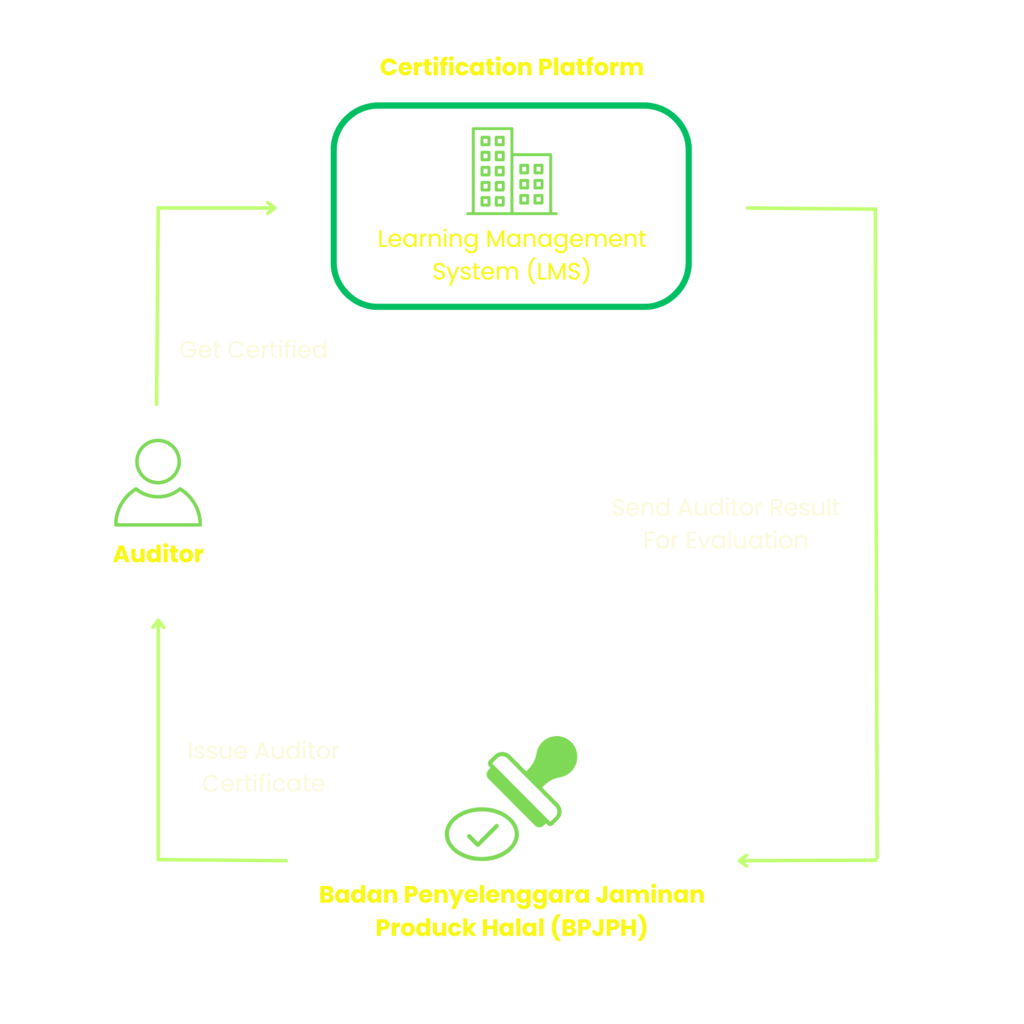
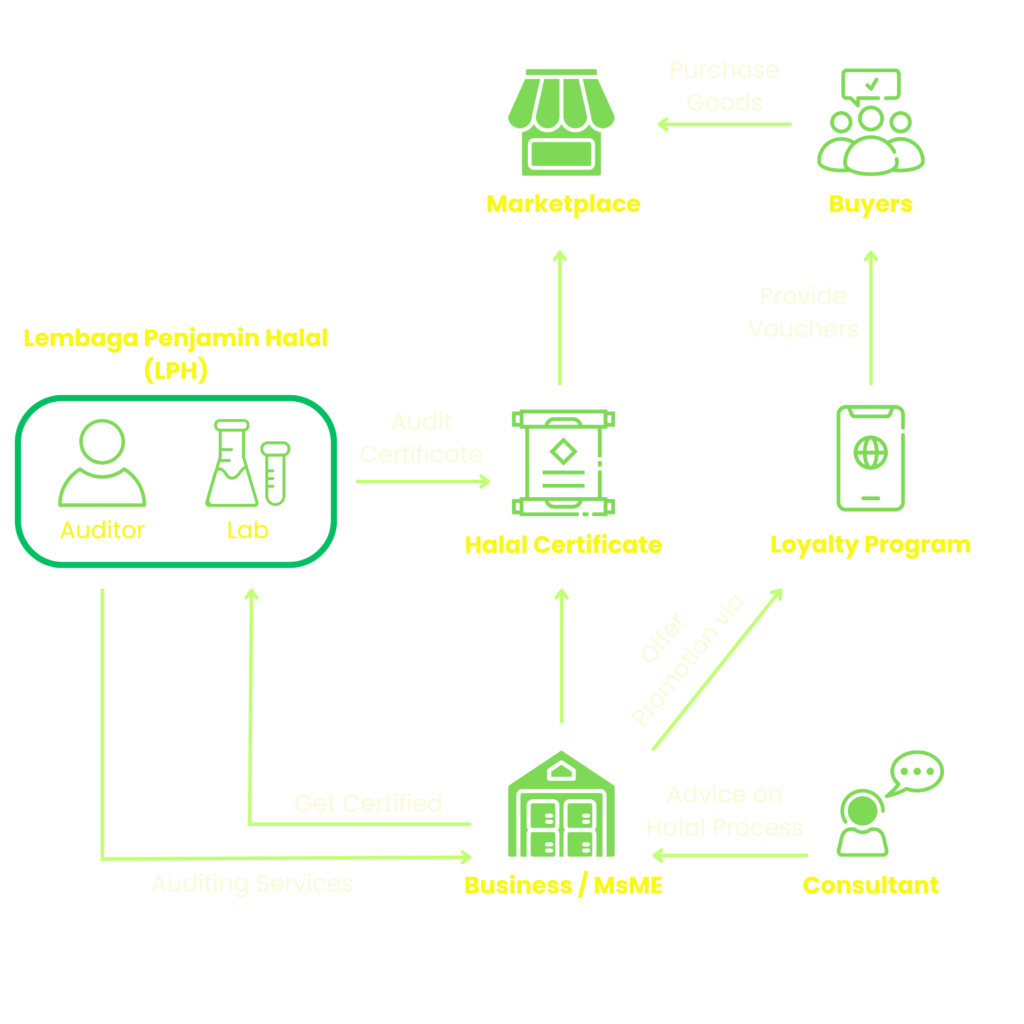
The Smart Village project in Malaysia aims to transform rural areas into digitally empowered communities through advanced technology and digital infrastructure, improving residents’ quality of life and fostering economic growth.
Key Components:
Digital Infrastructure: Establishing high-speed internet through fiber optics, satellite, and mobile networks to ensure seamless communication and access to digital services.
Smart Agriculture: Integrating IoT devices, drones, and machine learning for precision farming, enhancing productivity and sustainability through soil monitoring, optimized water usage, and crop yield prediction.
Digital Education: Providing e-learning platforms, vocational training, and workshops to improve digital literacy and technical skills for rural residents.
Healthcare: Implementing telemedicine and mobile health clinics to offer quality healthcare services and reduce the need for long-distance travel.
E-Government Services: Digitizing government services for online access to public services, including digital identification, application processes, and electronic payments.
Economic Development: Supporting local entrepreneurs and small businesses through digital platforms and e-commerce to expand markets and increase revenue.
Environmental Sustainability: Promoting renewable energy, waste management, and conservation efforts, including the use of solar panels and biogas systems.
The digitalization of village-owned enterprises (BUMDES) in Indonesia aims to empower local communities and foster economic growth through digital technology, enhancing operational efficiency and market reach for approximately 76,000 BUMDES.
Key Components:
Digital Infrastructure: Establishing high-speed internet through fiber optics, satellite, and mobile networks to ensure seamless connectivity.
E-Commerce Platforms: Developing e-commerce platforms for online sales and market expansion, connecting village enterprises to a broader customer base.
Digital Payment Systems: Implementing mobile payment apps, electronic banking, and digital wallets for secure and convenient financial transactions.
Capacity Building and Training: Providing digital literacy and technical skills training through workshops, online courses, and hands-on sessions in digital marketing, financial management, and e-commerce operations.
Integrated Management Systems: Deploying systems like inventory management, CRM, and ERP to optimize operations and improve decision-making.
Data Analytics and Reporting: Using data analytics tools to monitor and analyze performance, generating reports to inform strategic planning.
Smart Agriculture and Livelihood Programs: Promoting smart agriculture practices with IoT devices, drones, and precision farming techniques to enhance productivity and sustainability.
Community Engagement and Support: Encouraging community involvement and partnerships with local governments, NGOs, and private sector entities to provide resources, mentorship, and funding.

55,000 Students / 3 Campuses: This project aims to develop a smart campus system at Brawijaya University.
Data Collection and Analysis: The project will involve regular surveys and data collection aligned with academic schedules and campus needs. Additional apps will be developed to enrich Point of Interest (PoI) data, capturing snapshots of campus infrastructure and services. Visualization and analysis of data will help in effective decision-making and planning.
Smart Agriculture Practices: Mapping land conditions through lab surveys and implementing smart agriculture practices will be a key component. This includes:
The ASEAN University Enterprise Start-Up initiative is a collaborative effort between universities in Malaysia, Indonesia, Thailand, and the Philippines to develop and implement smart campus applications. This project involves key partner institutions including Asia Pacific University, TusStar Malaysia, and TsingHua University Holdings. The aim is to foster innovation, enhance educational environments, and improve campus management across Southeast Asia.
The ASEAN University Enterprise Start-Up initiative aims to transform campus operations through the development and implementation of smart campus applications. By leveraging the expertise and resources of partner institutions, the project will enhance educational environments, promote sustainability, and foster innovation across Southeast Asia.
This project focuses on establishing AI data centers and related training programs in Malaysia and Indonesia, in partnership with AP Uni, TusStar Malaysia, and GamaSky.
Key Components:
AI Data Centers: Building state-of-the-art AI data centers to support data processing, storage, and advanced computing needs.
Training Programs: Developing comprehensive training programs to enhance skills in AI, data science, and related technologies for local talent.
Partnerships: Collaborating with AP Uni, TusStar Malaysia, and GamaSky to leverage expertise and resources for project success.
Economic Growth: Driving economic development by creating job opportunities and fostering innovation in AI and technology sectors.
Ecosystem Development: Establishing a supportive ecosystem for AI research, startups, and enterprises to thrive.
Infrastructure Enhancement: Upgrading digital infrastructure to support the AI data centers and ensure robust connectivity and performance.
This initiative aims to boost the technological landscape and economic growth in Malaysia and Indonesia through the development of AI data centers and training programs.
Network Centric Service Access
In the past, managing fixed broadband (e.g., home internet) and wireless (e.g., mobile) networks separately posed significant challenges and expenses in ensuring consistent services and a positive customer experience. As contemporary services increasingly rely on both types of networks, the real-time management of these networks has become a formidable task.


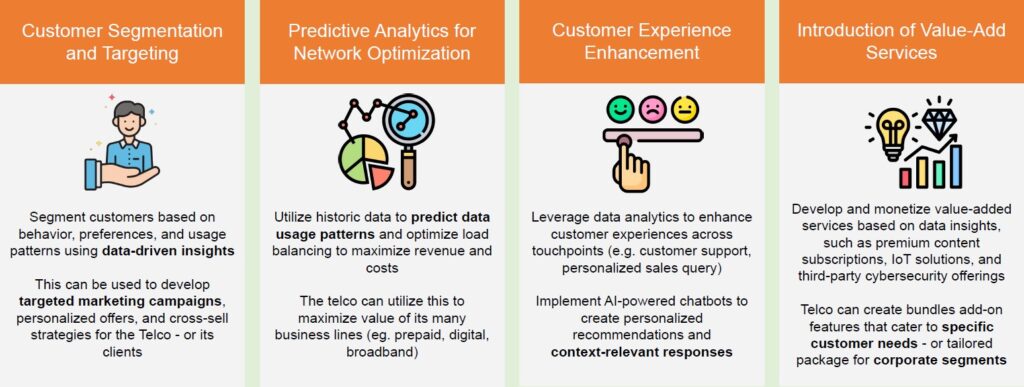
Agricultural Survey, conducted every 10 years, gathers data on farmland, crops, harvests, farmers, and territory. However, it’s seen as lengthy, costly, and infrequent. To improve, the data should be compiled into a digital twin of agriculture, updated more frequently. This includes regular photo imagery of national agricultural land and detailed analysis.
Estimating agricultural production per crop type, region, and time period is crucial. This would create an updated visualization serving as a digital twin of the national agricultural sector.
For production and distribution, data collection should align with production facility schedules and cultivation needs, with additional apps enriching Point of Interest (PoI) data. Capturing a snapshot of agricultural supporting infrastructure is also vital for capacity and production planning.
Visualizing and analyzing effective crop land due to natural disasters or crop failure related to agricultural insurance protection is essential.
Mapping land conditions through lab surveys and smart agriculture practices is recommended, including soil condition labs and terrain mapping for implementing smart agriculture with drones, IoT, and machine learning.
Our Users: Ministry of Agriculture, Central Bureau of Statistics, Provincial Government, District
Government, Ministry of Rural Affairs, Agricultural Group Association, State-Owned Enterprises,
National Food Agency, Logistics Agency, Village-Owned Enterprises, Ministry of Forestry.
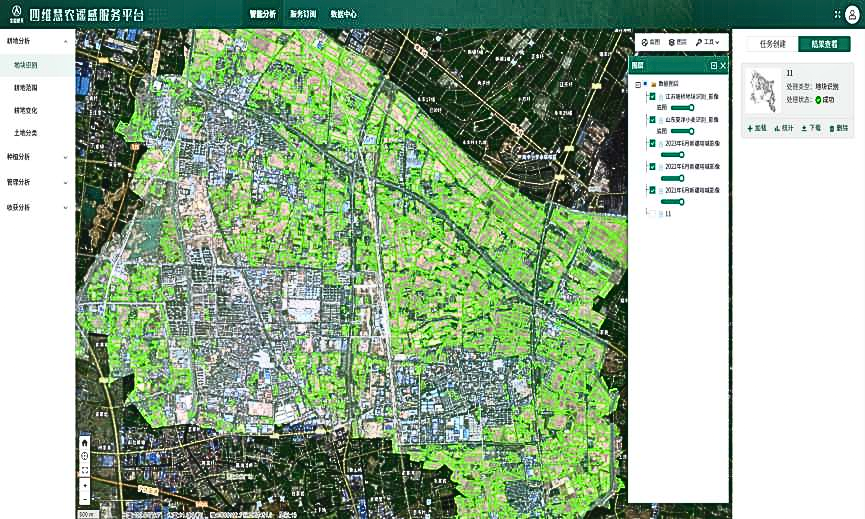
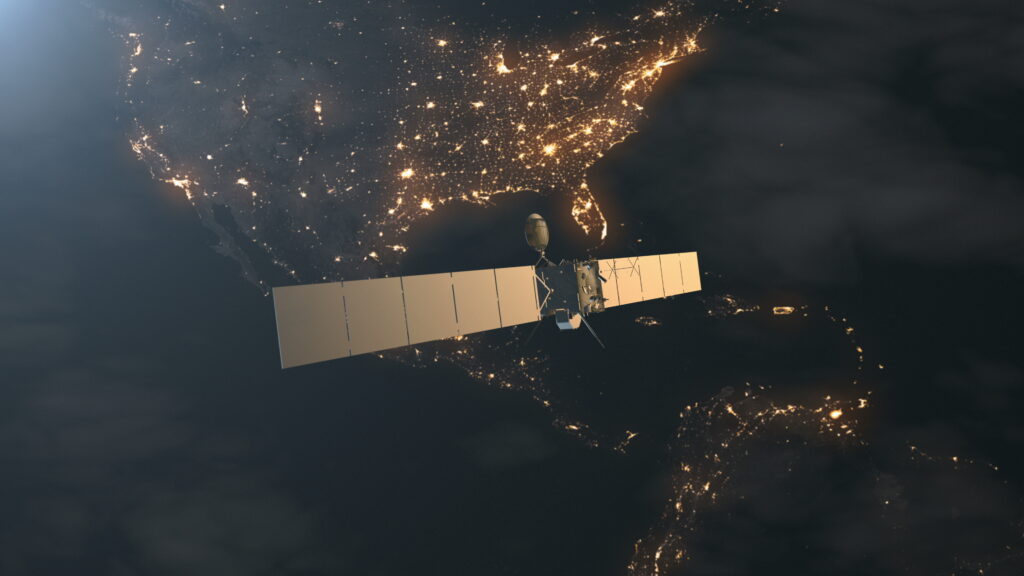
This project aims to create a city with zero waste and zero carbon emissions, likely in collaboration with the Chinese entity TUS-EST.
Key Components:
Sustainable Infrastructure: Developing green buildings and infrastructure with energy-efficient designs to minimize carbon footprint.
Renewable Energy: Utilizing renewable energy sources like solar, wind, and biomass to power the city, reducing reliance on fossil fuels.
Waste Management: Implementing comprehensive waste management systems to achieve zero waste, including recycling, composting, and waste-to-energy technologies.
Public Transportation: Promoting eco-friendly public transportation options such as electric buses and bikes to reduce carbon emissions.
Smart Technology: Integrating smart technologies for efficient resource management, including IoT for monitoring energy usage and waste reduction.
Green Spaces: Creating and maintaining green spaces to enhance air quality and provide natural carbon sinks.
Community Engagement: Involving residents in sustainability initiatives through education and participation in green practices.
Partnerships: Collaborating with TUS-EST and other stakeholders to leverage expertise and resources for sustainable urban development.


To address Indonesia’s nutrition challenges, particularly stunting in children, a central kitchen model is proposed for mass nutrition distribution. Technological advancements in food manufacturing would drive down costs to reach a target budget of $1 per meal. Localized distribution would be key to scalability, reaching Indonesia’s 17,000 islands.
Adapting to local tastes and resources is crucial. Investing in food technology manufacturing could open diverse opportunities, especially in the personalized nutrition market. Tailored dietary solutions based on local tastes and resources could cater to individual health needs and preferences.
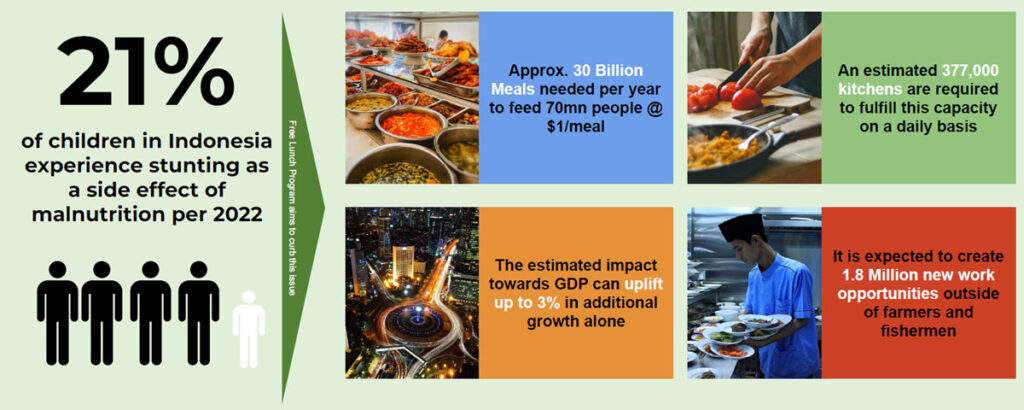
The focus would be on improving nutrition for pregnant and breastfeeding women to reduce stunting risks, as well as enhancing nutrition for children and young adults for overall growth. Access to nutrition for healthcare workers would also be prioritized as first-line assistance for combating stunting.
This approach aims to fulfill Indonesia’s nutrition program targets. Currently, 21% of Indonesian children experience stunting due to malnutrition. The goal is to provide approximately 30 billion meals per year at $1 per meal, requiring an estimated 377,000 kitchens on a daily basis. This initiative is expected to create 1.8 million new work opportunities and uplift GDP by up to 3% through additional growth.
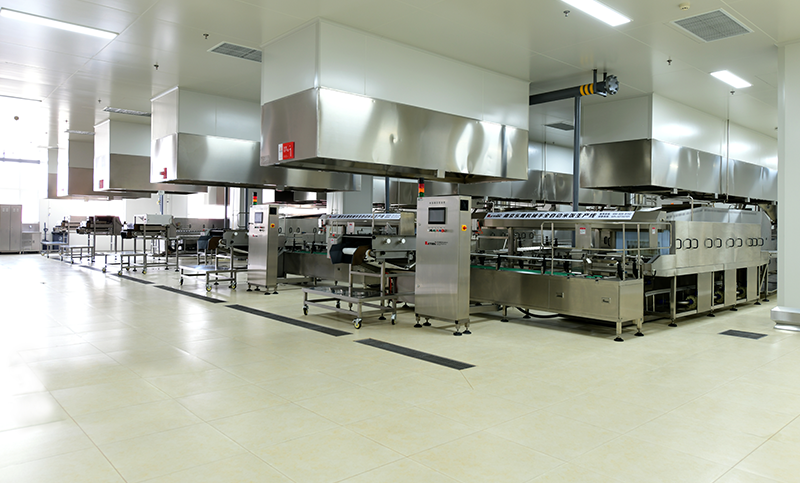

The Cross Border Trading and Suppliers projects under the Regional Comprehensive Economic Partnership (RCEP) focus on the export and import of various goods and equipment. These projects aim to leverage the trade agreements within the RCEP framework to facilitate smoother and more efficient cross-border transactions. Here’s a breakdown of the focus areas:
Electrical and Electronics (E&E)
Liquefied Natural Gas (LNG) and Liquefied Petroleum Gas (LPG)
Coal
Cryogenic ISO Tanks and Equipment
Central Kitchen Equipment
Imports: Importing innovative central kitchen equipment to enhance the efficiency and quality of local food service operations.
